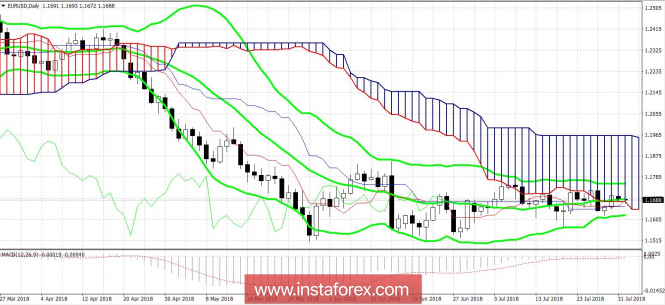The euro-dollar pair stayed briefly yesterday within the framework of the 17th figure. The growth of key European indicators and the weakness of the American Core PCE could not hold the price at daily highs. By the end of the day, the pair had returned to previous levels.
The mood of traders was spoiled by the International Monetary Fund, which recalled the Greek debt problem. The Greeks last attracted attention more than a year ago (in May 2017), when Athens announced that another payment of 7 billion euros is inestimable for the country. But then, the crisis was avoided. In July 2017, the European Stability Mechanism (ESM) agreed to give Greece another tranche of aid of 8.5 billion euros, to service the debt and to pay off the "body" of debt. Traders breathed a sigh of relief and safely forgot about the problem of Greek debts, although the problem itself did not go away.
Actually, this fact was reminded in the IMF. The fact is that in August, Greece will withdraw from the external support program of ESM with a huge external debt, which is about 180% of the country's GDP. The reforms carried out brought their result, and at the moment, the liquidity reserve reached 24 billion euros, this amount is enough to service the debt for the next two years.
This fact is recognized by the IMF, more distant prospects have become a cause for concern. According to Christine Lagarde, the Greeks will not be easy to ensure the growth of the country's economy to 3.5% by 2022, although such ambitions are voiced by Athens. Lagarde warned that there are political risks in the country, a high probability of "reform fatigue", the potential for increased unemployment and slow growth in trade. All these factors, according to the head of the IMF, can lead to the fact that the volume of reserve cash reserves in four years will drop to 12 billion euros.
Thus, the International Monetary Fund, on the one hand, recognized the real successes of the Greek government (last year real GDP growth was 1.4%), but, on the other hand, noted a high degree of uncertainty about the future prospects (in the period 2021-2022 and further).
Here, it is worth recalling that at the end of June, the Eurogroup approved the completion of the third macro-financial assistance program for Greece. Brussels extended for ten years the maturity of EFSF (European Financial Stability Facility) loans and agreed on a preferential 10-year regime for interest payments on these loans. As for direct financial assistance (it is about 15 billion euros), this tranche is also agreed by the Eurogroup, 5.5 billion will be used to service the Greek debt, and the remaining 9.5 will be used as a monetary pillow.
But, there is one "but", that the above money was transferred to the Greeks by ESM, the consent of the governments of all EU countries is necessary. On July 13, all heads of finance ministries of the euro area approved this issue, except Germany. The Germans took this decision because the Greeks had postponed the date of raising taxes on sales. However, according to most experts, this is a temporary hitch. Athens, in the end, will not risk a trench, and the Germans, in turn, will not risk the financial stability of the eurozone. Therefore, with a high probability of this tranche will be approved in the foreseeable future.
It is also worth noting that the representatives of the Greek government did not agree with the conclusions of the IMF. In their opinion, the currency fund unnecessarily dramatizes the situation, focusing on the weaknesses of the Greek economy and ignoring the impact of the reforms. Just a month ago, the Greeks again "tightened their belts". In Greece, they reduced the level of income that is not taxed, reduced the size of pensions to new pensioners, reduced social spending and approved the privatization of a number of state companies. Just a few weeks, after the adoption of this package of laws, S&P upgraded Greece's credit rating from "B" to "B +" (outlook "positive" rating).
In other words, the problem of Greek debts is not on the agenda and in the coming years will not be relevant. Why did the European currency react so sharply to such distant forecasts? According to some analysts, Christine Lagarde cast a "shadow of doubt" on the feasibility of completing the QE at the end of this year, although the report does not directly mention this. Against the backdrop of strong inflation and a decrease in unemployment, the IMF report yesterday became a kind of "contrast shower", which cooled the bulls EUR / USD.

However, such fundamental factors do not have a long-term impact on the market. The voiced prospects look too remote, and there are too many "ifs" in the IMF scenario. Therefore, today, traders will switch to the meeting of the Federal Reserve, the results of which will be determined by the vector of movement EUR / USD. If the tonality of the accompanying statement will be cautious and pigeon-like, the pair will quickly restore its positions, especially against the background of the growth of European inflation. The main objective of corrective growth remains the same, 1.1760 (the upper line of the indicator Bollinger Bands on the daily chart).
The material has been provided by InstaForex Company - www.instaforex.com